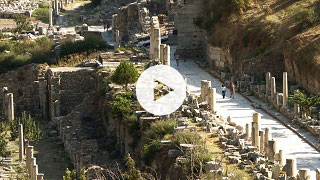16:1–16 In this final chapter, Paul sends greetings to various acquaintances and fellow missionaries who live in Rome. Paul encourages them to welcome Phoebe, who likely delivered Paul’s letter to the Romans. He also wants to unify the Roman Christians and partner with them in his ministry to Spain. |
16:1 Phoebe Possibly a wealthy Gentile Christian who delivered Paul’s letter to the Romans.
who delivered Paul’s letter to the Romans.
 New Testament Women Table
New Testament Women Table
a servant Paul uses the Greek word diakonos here, suggesting that Phoebe may have held the office of deaconess in the church at Cenchrea.
 Diakonos Word Study
Diakonos Word Study
16:2 saints See note on Rom 1:7.
helper The Greek word used here, prostatis, probably means that Phoebe was a patron who supported Paul financially.
16:3 Prisca and Aquila A wife and husband
and husband who assisted Paul in his missionary work (see Acts 18:2–3). They helped establish the church in Ephesus (Acts 18:18; 1 Cor 16:19). At the time they met Paul, they had left Rome because the emperor, Claudius, had expelled all the Jews (Acts 18:2). It is unknown when they returned to Rome or what type of ministry they had there.
who assisted Paul in his missionary work (see Acts 18:2–3). They helped establish the church in Ephesus (Acts 18:18; 1 Cor 16:19). At the time they met Paul, they had left Rome because the emperor, Claudius, had expelled all the Jews (Acts 18:2). It is unknown when they returned to Rome or what type of ministry they had there.
16:4 for my life Indicates that Prisca and Aquila put their lives in danger for Paul’s sake, possibly during the riot in Ephesus (Acts 19; compare Rom 5:8).
churches of the Gentiles The early church met in private homes and marketplaces.
16:5 the first convert The Greek text here literally means “first fruit.” See 8:23 and note; 11:16 and note.
16:7 Andronicus and Junia “Junia” is most likely a woman’s name, so this probably refers to another husband
is most likely a woman’s name, so this probably refers to another husband and wife ministry team. They likely were converted by Hellenists in Jerusalem.
and wife ministry team. They likely were converted by Hellenists in Jerusalem.
apostles This designation likely is used in a generic sense to refer to missionaries who are sent out (compare 2 Cor 8:23).
16:11 Narcissus Possibly the Narcissus who was freed from slavery and served the Roman emperor, Claudius.
who was freed from slavery and served the Roman emperor, Claudius.
16:13 Rufus Possibly the son of Simon of Cyrene (Mark 15:21).
of Simon of Cyrene (Mark 15:21).
16:16 with a holy kiss A customary greeting that signified fellowship and unity within the body of Christ. See 1 Cor 16:20; 2 Cor 13:12; 1 Thess 5:26; 1 Pet 5:14.
16:17–20 Paul adopts a surprisingly harsh tone to urge the Roman believers to be vigilant against false teachers who might cause dissension. He exposes the true motivations of these individuals and reassures the Roman believers that God will triumph over His enemies. |
16:17 who cause dissensions and temptations The early church consistently faced the threat of false teachers. Paul claimed that he warned the church at Ephesus of this problem “night and day” (see Acts 20:25–31). The false teachers mentioned in Rom 16:17 not only cause conflict among believers, but more seriously spread false doctrine in the church.
16:18 their own stomach This might describe false teachers who emphasized Jewish dietary laws (see 14:2 and note; Phil 3:19 and note) or sought to serve their selfish desires (see Rom 13:14).
they deceive Such false teachers fit the description of the wicked in 3:13.
16:19 your obedience Compare 6:17.
16:20 God of peace Refers to the God who brings peace (see note on 5:1), in contrast to the discord caused by false teachers (v. 17).
Satan The enemy of God’s people who, like the false teachers, tries to disrupt the unity of believers (compare 2 Cor 2:5–11; 11:13–15).
of God’s people who, like the false teachers, tries to disrupt the unity of believers (compare 2 Cor 2:5–11; 11:13–15).
under your feet Paul draws on the ot Scriptures (Psa 110:1) to comfort his audience with a message of hope: God will soon defeat Satan and their enemies. The nt frequently quotes Psa 110:1 to depict all things being placed under the feet of Christ (e.g., Luke 20:43; Acts 2:35; Heb 10:13). Here Paul refers to all things being placed under the feet of believers to emphasize their participation in God’s victory.
16:21 Timothy See note on 1 Tim 1:1.
Lucius Possibly a prophet from the church at Antioch in Syria (Acts 13:1).
Jason Possibly the same individual who provided Paul with refuge during a riot in Thessalonica (Acts 17:5–9).
16:22 Tertius Probably a professional scribe who took Paul’s dictation.
who took Paul’s dictation.
16:23 Gaius This could refer to one of several people: a man from Derbe who accompanied Paul on a missionary journey (Acts 20:4)’ a Corinthian whom Paul baptized (1 Cor 1:14), or a leader of a church in Asia Minor (3 John 1).
Erastus Possibly the man whom Paul sent to Macedonia (Acts 19:21–22).
16:25–27 Some ancient manuscripts place Rom 16:25–27 after 14:23 or 15:33, while others omit the verses entirely. These verses contain a doxology—a hymn to God—using several of the key themes of the letter (e.g., mystery, Gentiles, and obedience). |

|
About Faithlife Study BibleFaithlife Study Bible (FSB) is your guide to the ancient world of the Old and New Testaments, with study notes and articles that draw from a wide range of academic research. FSB helps you learn how to think about interpretation methods and issues so that you can gain a deeper understanding of the text. |
| Copyright |
Copyright 2012 Logos Bible Software. |
| Support Info | fsb |
 Loading…
Loading…



